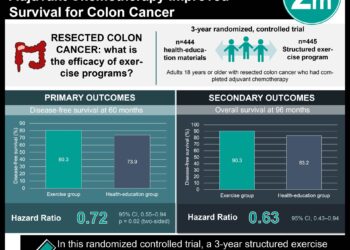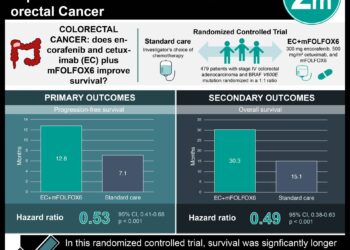Colorectal cancer prevention though screening colonoscopies may have less benefit in those older than 75
1. This study estimates that the 8-year risk for colorectal cancer (CRC) in Medicare beneficiaries was reduced by screening colonoscopy from 2.6% to 2.2% in those 70-74 years of age and from 3.0% to 2.8% in those 75-79 years of age.
2. These results could assist patients, doctors, and policymakers in making decisions regarding screening colonoscopies.
Evidence Rating Level: 2 (Good)
Study Rundown: In the United States, 50 000 deaths related to CRC occur every year. Although screening colonoscopies may reduce CRC mortality and incidence, these procedures are more invasive and require more resources than techniques such as fecal occult blood testing (FOBT) and sigmoidoscopy. Colonoscopies also have a risk of bowel perforation and other complications. Therefore, it is important to evaluate the effectiveness and safety of this procedure. Ongoing trials regarding screening colonoscopies exclude those older than 75. From 2004-2012, this study followed 1 355 692 Medicare beneficiaries of 70-79 years of age who had average CRC risk, used preventive Medicare services, and had no colonoscopies in the previous 5 years. The study found that screening colonoscopy may have modestly reduced CRC risk in those aged 70-74 and a smaller benefit in those aged 75-79. Adverse risks were found to be low in both groups, but greater in the 75-79 age group. Current recommendations from the U.S. Preventive Services Task Force include routine CRC screening using any method for those 50-75 years with average CRC risk and individualized decisions for those aged 76-85. The results of this study could assist patients, doctors, and policymakers in making decisions regarding screening colonoscopies
Strengths of the study include its large scale and length. In addition, they checked that their trial emulation method was valid by analyzing data with an FOBT group to evaluate their observational estimates versus published FOBT randomized trial estimates. A limitation of the study is that estimates could be confounded by CRC risk factors that were not measured. However, other studies suggest that effect estimates are not very different even when adjustments are made for potential confounders. Another limitation is that CRC mortality data was unavailable.
Click to read the study in Annals of Internal Medicine
Relevant Reading: Assessing the Impact of Screening Colonoscopy on Mortality in the Medicare Population
In-Depth [prospective cohort]: This study included Medicare beneficiaries aged 70-79 without a history of CRC. Candidates who had conditions or procedures that may involve having a colonoscopy for non-screening purposes were excluded. Eligible participants were followed from their 70th birthday (baseline) until one of these events occurred: CRC diagnosis, death, Medicare enrollment criteria were violated, or December 2012 arrived. If the participants received a colonoscopy within 7 days of baseline were placed in the screening colonoscopy group. All others were placed into the no-screening group. Observational data was designed to mimic a trial that had these two groups.
The 8-year risk for CRC was reduced by screening colonoscopy from 2.62% (CI, 2.56% to 2.67%) to 2.19% (95% CI, 2.00% to 2.37%) in those 70-74 years of age and from 2.97% (CI, 2.92% to 3.03%) to 2.84% (CI, 2.54% to 3.13%) in those 75-79 years of age. In the colonoscopy group, the 30-day risk for adverse events was 5.6 events per 1000 individuals (CI, 4.4 to 6.8) and 10.3 per 1000 (CI, 8.6 to 11.1) in the 70-74 and 75-79 age groups, respectively.
Image: PD
©2016 2 Minute Medicine, Inc. All rights reserved. No works may be reproduced without expressed written consent from 2 Minute Medicine, Inc. Inquire about licensing here. No article should be construed as medical advice and is not intended as such by the authors or by 2 Minute Medicine, Inc.









